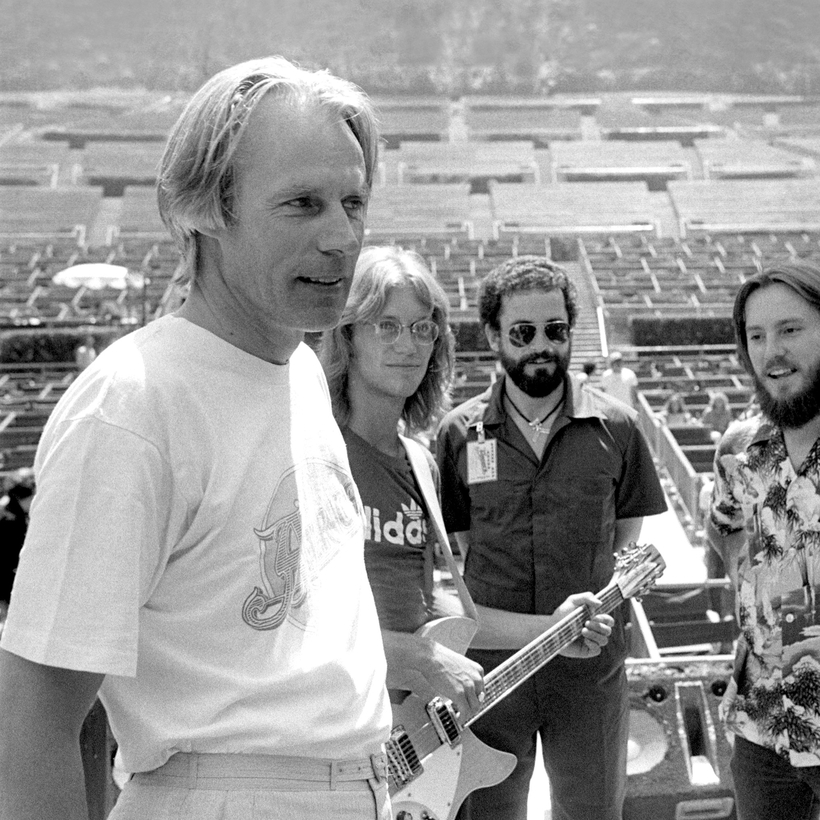August 3, 1975. We, the band America, were riding high on the recent success of our second No. 1 record, “Sister Golden Hair,” the first release from our latest album, Hearts.
Hearts was our fifth album, but the second consecutively produced by the legendary Beatles producer George Martin. It followed closely after the first album George had produced for us, Holiday, which included the hits “Tin Man” and “Lonely People.” An even bigger success, “Sister Golden Hair” put us in the rarefied air of being able to headline virtually anywhere we chose.
We had played the Hollywood Bowl once before, but this time we’d be joined by George conducting a symphony. George would be opening the show performing a piece entitled Beatles to Bond and Bach, a selection of pieces beautifully woven together, including his orchestrated work with the Beatles. He’d then remain onstage with the orchestra for our show.
We were clearly in the “spare no expense” chapter of our journey, and the Bowl show would include a skywriter in a biplane spelling out our band name as he looped around over the crowd. A hot-air balloon would ascend from behind the stage to float majestically overhead and hopefully take some film of the evening’s event. Then there would, of course, be George and the orchestra, which at any time would have been spectacular. The entire day would be shot by our dear friend Henry Diltz, so we knew we had that covered. Rehearsals in the afternoon went well, and we felt pretty good about the upcoming evening.

The first sign of trouble occurred when the biplane noisily circling overhead was taking what seemed to be an unusually long time with the A of our “America.” As he continued on with the M, we and the entire audience could see the A fading in the Hollywood breeze. The end result was a collection of cirrus-like white wisps with an almost readable I C A rapidly fading into the slowly setting sun.
That turned out to be an immense success compared to the hot-air balloon, which found out its basic function—to fly—was, at least for tonight, an impossibility. It made a huge racket, with its gas flames blasting, rising just enough from its perch behind the Bowl for the crowd to see it and cheer encouragingly, only to then drop again out of sight. Boos would follow from the audience as the crew attempted four or five more times to take flight. Each try was met with louder and longer replies from a crowd that seemed to be getting more pleasure from the botched attempts than if the thing had actually flown.
Showtime began with George looking splendid in a cream tuxedo. Baton in hand, he brought the 70-piece orchestra to life. We were off!
His show was stunning from start to finish, and it appeared to be something George had dreamed of for a long time. This was his first-ever live performance on a stage in the United States, and we were on the receiving end of a truly magical show. It closed with a rousing arrangement of the Beatles’ “Yellow Submarine.” It would be a hard act to follow.
We needn’t have worried. Our band had been honing the live set over the last three years of touring, and the strength of our existing catalogue, which had won us a Grammy in 1972, as well as George and 70 of Los Angeles’s finest classical musicians, presented us in a way we might never achieve again. The show progressed through 20 songs with barely a hitch.

The finale of “Horse with No Name” was to include a massive fireworks display stretching across the entire arc of the historic Hollywood Bowl. There had been some concern about sparks from the display dropping down to the stage, so it was quietly arranged for a man with an umbrella to be on call so he could race out and hold said umbrella over George. And, yes, there were sparks, and, yes, the man with the umbrella did have to take to the stage. It added a Magritte-like image to an already amazing finale.
As we gathered backstage full of adrenaline from what we’d just experienced, I saw a friend, the harpist in the orchestra. “Gail! Wasn’t that amazing!?” She looked at me with eyes flaring. “Are you out of your mind?! I was on fire!” Apparently, some sparks had caught Gail’s gown ablaze and she’d run offstage screaming during the encore. None of us saw any of this, as we’d been caught up in the moment, but I can bet it was a show that Gail never forgot.
Rushing to George’s dressing room for an all-around patting of the shoulders, George looked at us and said, in classic George Martin fashion: “Time for a martini, lads!”
America: Live from the Hollywood Bowl, a recording of America’s 1975 concert, is out today
Gerry Beckley is a singer-songwriter and a founding member of the band America

